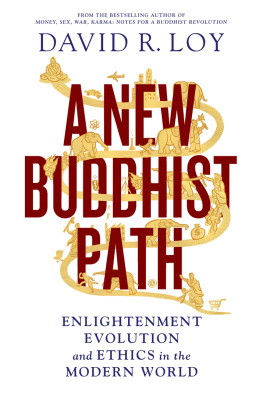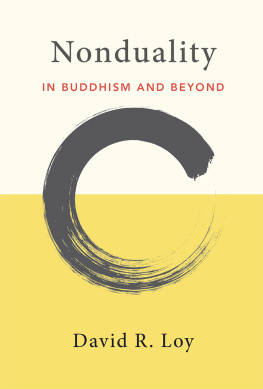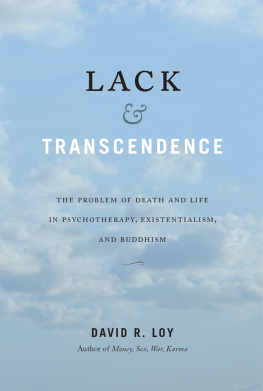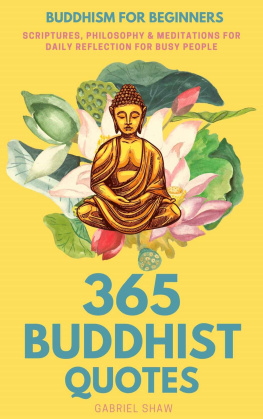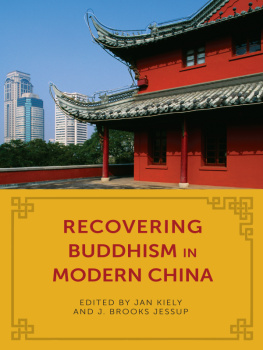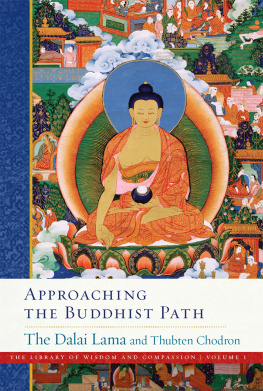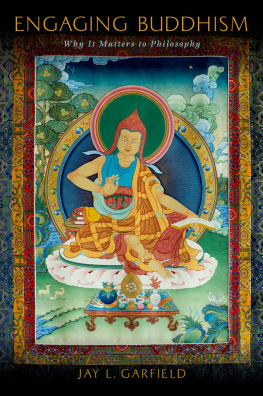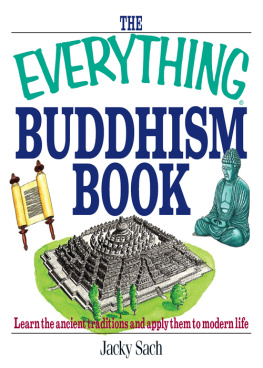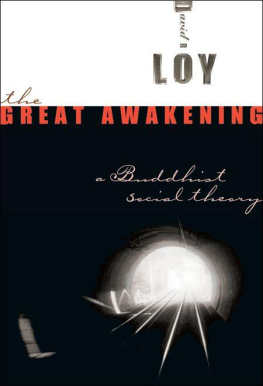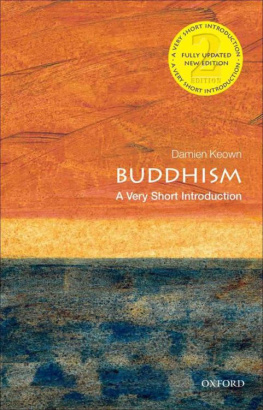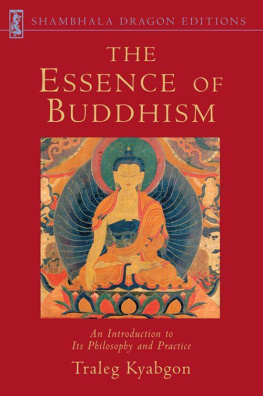Praise for A N EW B UDDHIST P ATH
In this new book, Zen teacher, sage, and activist David Loy offers a fresh Buddhist perspective for a post-Axial age that addresses and challenges adherents of any religion or no religion, as we together face the gravest crises of our history. A New Buddhist Path lays out the contours of a liberating spiritual practice, a new story, and an integral vision that links personal transformation with wholehearted engagement toward healing our deeply wounded and fragmented Earth community.
Ruben L. F. Habito, author of Living Zen, Loving God
This gripping, important, and ultimately heartening book by David Loy is a wake-up call for Buddhists and everyone else on how to respond to current crises.
Lila Kate Wheeler, author of When Mountains Walked
Any book by David Loy makes me sit up and take notice. A favorite Buddhist voice, he reliably brightens my day by giving me confidence in our capacity to preserve the precious gift of life.
This breathtakingly insightful book captures what the Buddhadharma most distinctively brings to this apocalyptic moment in our crisis-ridden world. For one like me, who loves the Buddhas teachings with the same heart that grew up loving Hebrew prophets and Jesus, and the same mind that peered at his Dharma through the lens of systems science, David Loys presentation of A New Path is both trustworthy and thrilling. I have always counted on David Loy for his explication of the systemic, institutionalized forms of greed, hatred, and delusion, the three poisons now threatening all life on Earth. With this treasure of a book I equally prize his wide-angle reflections on collective awakening and his good, grounding presentation of the bodhisattva archetype, so meaningful to so many today, Buddhists and non-Buddhists alike.
Joanna Macy, author of Coming Back to Life
I look to David Loys writing to guide me wisely through the snares and thickets of modernity. While the Dharma is ageless, it must be reinvented time and again to meet our circumstances. That is Davids life work, bringing to bear a depth of practice, wisdom, and intellectual vigor. With many others on the Buddhist path I bow to him in gratitude.
Hozan Alan Senauke, Clear View Project, Berkeley CA
In A New Buddhist Path, Zen teacher David Loy has re-visioned the middle way for Western Buddhists. He describes a path that fully embraces both the amazing insights of the Buddhist tradition and the wealth of our contemporary critical analysis, while charting a course between the traps of a bare literalism and modernist materialism. He brings an unparalleled depth of both scholarship and deep spiritual insight to the project. I fear it has become a clich to declare an instant classic, but I really believe this is a book that will mark many hearts for many years to come. This is a manifesto of genuine spiritual freedom, written for our generation.
James Ishmael Ford, author of If Youre Lucky, Your Heart Will Break
David Loy is a wonderful guide along the latest turn of the Buddhas path, as the Dharma moves through the West, encountering science, democracy, and deep ecology. Loy masterfully shows us the relevance of the Dharma in the modern world, and how it can serve the greater good.
Wes Nisker, author of Essential Crazy Wisdom
The New Buddhism is the perfect tool for integrating ancient wisdom into our rapidly changing world. The discussion in these pages is a crucial one for our future.
Jaimal Yogis, author of Saltwater Buddha
A New Buddhist Path

A manifesto of genuine spiritual freedom.
JAMES ISHMAEL FORD, AUTHOR OF IF YOURE LUCKY, YOUR HEART WILL BREAK
WHAT IS THE MEANING OF ENLIGHTENMENT?
HOW CAN ONE RECONCILE MODERN SCIENCE WITH ANCIENT RELIGIOUS TEACHINGS?
WHAT IS OUR ROLE IN THE UNIVERSE?
In A New Buddhist Path, David R. Loy examines these questions and more, addressing head-on the most pressing issues of Buddhist philosophy in our time. Investigating the unexpected intersections of Buddhist teachings and the modern world, he uncovers a new Buddhist way: one that is faithful to important traditions but compatible with todays society.
THIS IS A NEW PATH FOR A NEW WORLD.
David R. Loys books include the acclaimed Money, Sex, War, Karma: Notes for a Buddhist Revolution, The Great Awakening: A Buddhist Social Theory, The World Is Made of Stories, and The Dharma of Dragons and Daemons: Buddhist Themes in Modern Fantasy. He lives in Boulder, CO.
To the new bodhisattvas
TABLE OF CONTENTS
INTRODUCTION:
In Quest of a Modern Buddhism
M AY YOU LIVE in interesting times, says the apocryphal Chinese curse, and for those on a Buddhist path these times are doubly interesting. As Buddhism spreads to the West (or to the modern world, since the West is globalizing), Buddhism is encountering its greatest challenge ever: the most successful civilization in human history, whose powerful technologies and formidable institutions offer apparently limitless possibilities along with unprecedented perils.
The naturalistic worldview and materialistic values of the modern world are quite different from what Buddhism traditionally has to offerand they also appear increasingly problematic and vulnerable, due to deeply rooted ecological, economic, and social crises that modernity has created but seems unable to resolve. Our predicament calls for new perspectives that question many of its priorities and presuppositions.
In a conversation not long before his death, the British historian Arnold Toynbee reflected that The present threat to mankinds survival can be removed only by a revolutionary change of heart in individual human beings. This change of heart must be inspired by religion in order to generate the willpower needed for putting arduous new ideals into practice. Does this help us to understand his reputed prediction that the introduction of Buddhism to the West may well prove to be the most important event of the twentieth century? that the introduction of Buddhism to the West may well prove to be the most important event of the twentieth century?
Whenever Buddhism has spread to a new culture, it has interacted with the indigenous traditions of that society, and the result of their encounter has been something better suited to that culture. Each is changed by the otherand there is no reason to suspect that anything different is happening today: it is a safe bet that the contemporary conversation between Buddhism and the modern world will lead to the development of new forms of Buddhism particularly adapted for the members of an emerging global civilization.
Yet that predictable result does not in itself clarify the role that Buddhism will play within this civilization. Will Buddhist temples and Dharma centers adapt to modern life by helping us cope with the stress of surviving in a deteriorating ecological and economic climate? Or will we appreciate Buddhist teachings and practices because they offer a radically different worldview, with an alternative perspective on whats happening now and what needs to be done? Or do we need both?
As these reflections suggest, the issue is not only what Buddhism can offer to modernity, but just as much what modernity offers to Buddhism. Before Buddhism came to the West, the West came to Buddhism, thanks to European imperialism and missionary proselytizing. It turned out to be a salutary wake-up call. The Mahayana scholar Edward Conze said that Buddhism hasnt had an original idea in a thousand years. Although Im dubious about his datesin the thirteenth century Zen master Dogen revolutionized traditional ways of conceptualizing the DharmaConzes basic point remains a challenge to Buddhism even if it applies only to the last seven hundred years. Is the encounter with modernity the best thing that has happened to Buddhism in a very long time?
Next page
